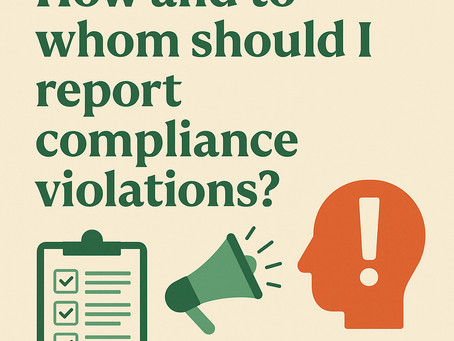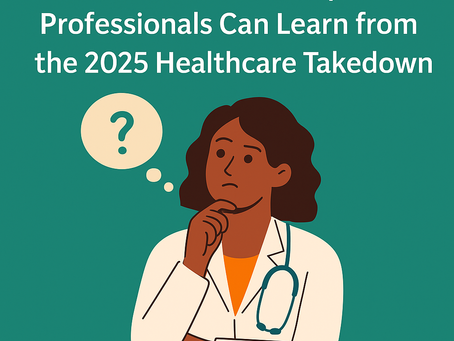top of page
Search


DOJ’s Emerging Whistleblower Program: How It Works and What It Means for Corporate Compliance
The Department of Justice (DOJ) has signaled and begun rolling out a whistleblower rewards framework aimed at incentivizing insiders and third parties to report corporate crime directly to prosecutors. While the program will continue to evolve through policy and rulemaking, its contours already create immediate implications for New York–based and U.S.-operating companies
Dennis Sapien-Pangindian
Nov 5, 20255 min read


Navigating HHS-OIG’s Self-Disclosure Protocol
The HHS-OIG Self-Disclosure Protocol is designed to encourage healthcare providers, suppliers, contractors, and grantees to self-report evidence of potential fraud or violations of federal healthcare program requirements. By voluntarily disclosing such conduct, entities may benefit from reduced penalties, a presumption against exclusion from federal programs, and a more collaborative resolution process, as opposed to facing government-initiated investigations or litigation.
Dennis Sapien-Pangindian
Nov 4, 20256 min read


Digital Health and the FDA: When Software Becomes a Medical Device
The FDA defines Software as a Medical Device (SaMD) as software “intended to be used for one or more medical purposes that perform these purposes without being part of a hardware medical device.”
In plain English: if your app, algorithm, or platform is intended to diagnose, cure, treat, mitigate, or prevent disease, the FDA may consider it a medical device — even if it’s just running on a smartphone.
Dennis Sapien-Pangindian
Oct 27, 20254 min read


The Top 5 Compliance Blind Spots for Early-Stage Digital Health Companies
Here are the five compliance blind spots that catch early-stage digital health companies off guard — and how to avoid them before they become expensive lessons.
Dennis Sapien-Pangindian
Oct 27, 20254 min read


The Compliance Divide: How Startups Can Compete with Big Healthcare Without Breaking the Rules or the Bank
For founders in digital health, biotech, or life sciences, compliance isn’t optional — but it also can’t become a black hole for resources. The challenge is building a compliance infrastructure that protects the company and satisfies regulators without spending like an enterprise.
Dennis Sapien-Pangindian
Oct 27, 20254 min read


What Silicon Valley Initially Misunderstood About Healthcare Compliance
Most founders think of compliance as overhead — a checklist to satisfy investors or legal counsel. In reality, compliance is the operating system for trust. It dictates how your product interacts with patients, payers, and partners.
Dennis Sapien-Pangindian
Oct 27, 20256 min read


Exclusion from Federal Healthcare Programs: Consequences and How to Appeal
For healthcare providers, suppliers, and businesses, few penalties are as devastating as exclusion from Federal healthcare programs. When the HHS Office of Inspector General (HHS-OIG) excludes an individual or entity, they are barred from participating in Medicare, Medicaid, and other federal health programs. This not only cuts off a vital revenue stream but can also damage reputation and cripple operations.
Dennis Sapien-Pangindian
Sep 15, 20254 min read


Information Blocking Enforcement is Finally Here – What “Actors” Should Know
After years of regulatory developments, enforcement is finally on the horizon for information blocking. On September 3, 2025, the U.S....
Dennis Sapien-Pangindian
Sep 9, 20254 min read


The DOJ-HHS False Claims Act Working Group: What Founders and Healthcare Businesses Need to Know
In 2025, the Department of Justice (DOJ) and the Department of Health and Human Services (HHS) announced the creation of a new False Claims Act (FCA) Working Group (https://www.justice.gov/opa/pr/doj-hhs-false-claims-act-working-group). This collaborative initiative brings together prosecutors, regulators, and investigators from across the federal government to aggressively pursue fraud, waste, and abuse in federal healthcare programs.
Dennis Sapien-Pangindian
Sep 5, 20253 min read


How and to Whom Should I Report Compliance Violations?
Discovering potential misconduct in your organization is never easy—but knowing what to do next can make all the difference. Whether you’re an executive, compliance officer, or legal counsel, a critical question follows: How—and to whom—should we report compliance violations?
Dennis Sapien-Pangindian
Jul 8, 20253 min read


What Healthcare Compliance Professionals Can Learn from the 2025 Healthcare Takedown
The 2025 National Healthcare Fraud Takedown was a sweeping enforcement action resulting in charges against 324 defendants across across 50 federal districts and 12 State Attorneys General’s Offices, linked to over $14.6 billion in fraudulent billings to Federal healthcare programs. this takedown offers valuable lessons for compliance professionals tasked with protecting their organizations.
Dennis Sapien-Pangindian
Jul 8, 20252 min read


How Should We Handle Whistleblower Complaints?
Whistleblower complaints can be uncomfortable. They often raise questions about leadership, culture, or internal controls—and can involve sensitive or high-stakes issues like fraud, harassment, discrimination, or regulatory violations.
But how your company handles whistleblower complaints says a lot about its values—and has real legal and reputational consequences.
Dennis Sapien-Pangindian
Jun 16, 20252 min read


When Should a Company Launch An Internal Investigation?
One of the most powerful tools in a company’s compliance and risk management arsenal is the internal investigation. Handled well, an internal investigation can uncover the facts, preserve trust, mitigate liability, and help the organization move forward. Handled poorly—or delayed too long—it can create legal exposure, reputational damage, and regulatory scrutiny.
Dennis Sapien-Pangindian
Jun 16, 20252 min read


How Do I Create a Compliance Training Program That Actually Works?
Regulators, customers, and business partners increasingly expect companies to show that they not only have a compliance program on paper, but that they have a culture of compliance—one where employees understand the rules and feel empowered to apply them in practice. Training is one of your best tools to build that culture. But to be effective, it must go beyond the basics.
Dennis Sapien-Pangindian
Jun 11, 20253 min read


Who Should Be Responsible for Compliance in a Small or Midsize Company?
The challenge for smaller businesses is: who owns compliance? You may not have the budget or headcount for a full-time Chief Compliance Officer. But regulators, customers, and partners still expect you to have a credible compliance program.
Dennis Sapien-Pangindian
Jun 11, 20254 min read


What Are Red Flags That Our Company Has Compliance Gaps?
A strong compliance program is designed to protect your company from legal risk, financial penalties, and reputational harm. But even the best-intentioned organizations can develop compliance gaps—places where policies are ignored, controls are weak, or misconduct goes undetected. Here are some of the most common red flags that your company may have compliance gaps—and what you can do about them.
Dennis Sapien-Pangindian
Jun 11, 20254 min read


What is Compliance—and What Should a Modern Corporate Compliance Program Include?
Compliance is more than just a legal buzzword—it’s a practical, essential part of running a modern business.
Dennis Sapien-Pangindian
Jun 9, 20253 min read


What Does DOJs Renewed Focus on Healthcare Fraud Mean for Healthcare and Life Sciences Companies?
On May 12, 2025, the U.S. Department of Justice's (DOJ) Head of the Criminal Division, Matthew R. Galeotti, i ssued a memorandum titled...
Dennis Sapien-Pangindian
May 14, 20252 min read
Asked and Answered: A Law Blog
bottom of page
